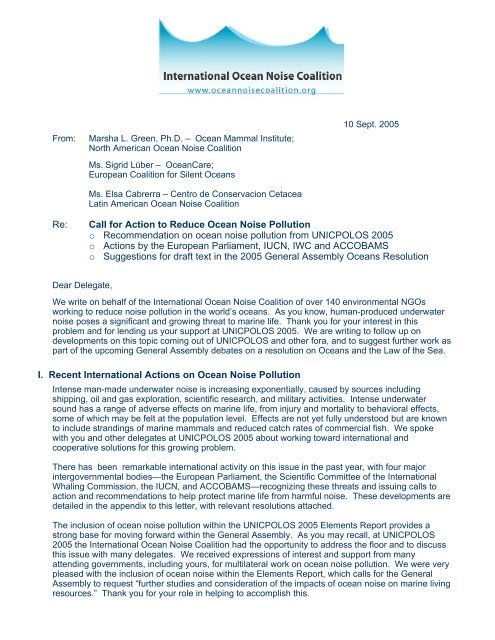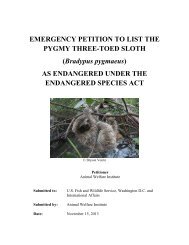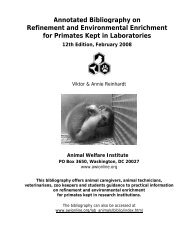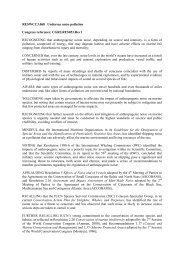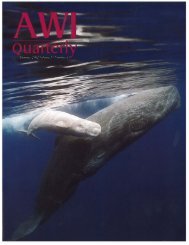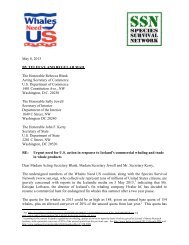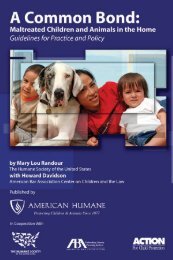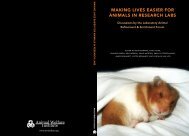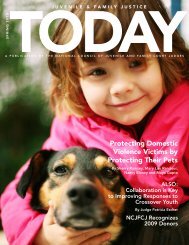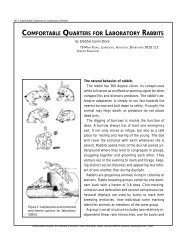Call for Action to Reduce Ocean Noise Pollution o Recommendation ...
Call for Action to Reduce Ocean Noise Pollution o Recommendation ...
Call for Action to Reduce Ocean Noise Pollution o Recommendation ...
Create successful ePaper yourself
Turn your PDF publications into a flip-book with our unique Google optimized e-Paper software.
From:<br />
Marsha L. Green, Ph.D. – <strong>Ocean</strong> Mammal Institute;<br />
North American <strong>Ocean</strong> <strong>Noise</strong> Coalition<br />
Ms. Sigrid Lüber – <strong>Ocean</strong>Care;<br />
European Coalition <strong>for</strong> Silent <strong>Ocean</strong>s<br />
Ms. Elsa Cabrerra – Centro de Conservacion Cetacea<br />
Latin American <strong>Ocean</strong> <strong>Noise</strong> Coalition<br />
10 Sept. 2005<br />
Re:<br />
<strong>Call</strong> <strong>for</strong> <strong>Action</strong> <strong>to</strong> <strong>Reduce</strong> <strong>Ocean</strong> <strong>Noise</strong> <strong>Pollution</strong><br />
o <strong>Recommendation</strong> on ocean noise pollution from UNICPOLOS 2005<br />
o <strong>Action</strong>s by the European Parliament, IUCN, IWC and ACCOBAMS<br />
o Suggestions <strong>for</strong> draft text in the 2005 General Assembly <strong>Ocean</strong>s Resolution<br />
Dear Delegate,<br />
We write on behalf of the International <strong>Ocean</strong> <strong>Noise</strong> Coalition of over 140 environmental NGOs<br />
working <strong>to</strong> reduce noise pollution in the world’s oceans. As you know, human-produced underwater<br />
noise poses a significant and growing threat <strong>to</strong> marine life. Thank you <strong>for</strong> your interest in this<br />
problem and <strong>for</strong> lending us your support at UNICPOLOS 2005. We are writing <strong>to</strong> follow up on<br />
developments on this <strong>to</strong>pic coming out of UNICPOLOS and other <strong>for</strong>a, and <strong>to</strong> suggest further work as<br />
part of the upcoming General Assembly debates on a resolution on <strong>Ocean</strong>s and the Law of the Sea.<br />
I. Recent International <strong>Action</strong>s on <strong>Ocean</strong> <strong>Noise</strong> <strong>Pollution</strong><br />
Intense man-made underwater noise is increasing exponentially, caused by sources including<br />
shipping, oil and gas exploration, scientific research, and military activities. Intense underwater<br />
sound has a range of adverse effects on marine life, from injury and mortality <strong>to</strong> behavioral effects,<br />
some of which may be felt at the population level. Effects are not yet fully unders<strong>to</strong>od but are known<br />
<strong>to</strong> include strandings of marine mammals and reduced catch rates of commercial fish. We spoke<br />
with you and other delegates at UNICPOLOS 2005 about working <strong>to</strong>ward international and<br />
cooperative solutions <strong>for</strong> this growing problem.<br />
There has been remarkable international activity on this issue in the past year, with four major<br />
intergovernmental bodies—the European Parliament, the Scientific Committee of the International<br />
Whaling Commission, the IUCN, and ACCOBAMS—recognizing these threats and issuing calls <strong>to</strong><br />
action and recommendations <strong>to</strong> help protect marine life from harmful noise. These developments are<br />
detailed in the appendix <strong>to</strong> this letter, with relevant resolutions attached.<br />
The inclusion of ocean noise pollution within the UNICPOLOS 2005 Elements Report provides a<br />
strong base <strong>for</strong> moving <strong>for</strong>ward within the General Assembly. As you may recall, at UNICPOLOS<br />
2005 the International <strong>Ocean</strong> <strong>Noise</strong> Coalition had the opportunity <strong>to</strong> address the floor and <strong>to</strong> discuss<br />
this issue with many delegates. We received expressions of interest and support from many<br />
attending governments, including yours, <strong>for</strong> multilateral work on ocean noise pollution. We were very<br />
pleased with the inclusion of ocean noise within the Elements Report, which calls <strong>for</strong> the General<br />
Assembly <strong>to</strong> request “further studies and consideration of the impacts of ocean noise on marine living<br />
resources.” Thank you <strong>for</strong> your role in helping <strong>to</strong> accomplish this.
International <strong>Ocean</strong> <strong>Noise</strong> Coalition<br />
10 Sept. 2005 - 2 -<br />
II. <strong>Recommendation</strong>s <strong>for</strong> the 2005 General Assembly Resolution on <strong>Ocean</strong>s and the Law<br />
of the Sea<br />
Building on this recognition of ocean noise by UNICPOLOS and other intergovernmental <strong>for</strong>a, and<br />
based on the support expressed by many governments in New York last spring, we are urging that<br />
the upcoming General Assembly Resolution on <strong>Ocean</strong>s and the Law of the Sea take a strong stance<br />
on ocean noise pollution.<br />
In particular, we urge that the General Assembly, in the preambular text of the resolution, recognize<br />
harmful anthropogenic noise as one of the types of pollution that is of particular concern <strong>for</strong> adverse<br />
impacts on the marine environment and biodiversity.<br />
We also urge that the General Assembly include language such as the following in the section of the<br />
resolution addressing the marine environment, marine resources, and marine biodiversity:<br />
Notes that anthropogenic ocean noise, depending on source and intensity, may degrade<br />
habitat and have adverse effects on marine life ranging from disturbance <strong>to</strong> injury and<br />
mortality, and there<strong>for</strong>e urges States and relevant international and national organizations<br />
<strong>to</strong> consider the impact of anthropogenic ocean noise on marine living resources; and, as<br />
lack of full scientific certainty shall not be used as a reason <strong>for</strong> postponing measures <strong>to</strong><br />
prevent environmental degradation, <strong>to</strong> take all measures appropriate <strong>to</strong> prevent, reduce<br />
and control the generation of harmful undersea noise..<br />
It would be our pleasure <strong>to</strong> discuss this issue with you in more detail at your convenience and <strong>to</strong><br />
receive any thoughts you may have on this language, or on the <strong>to</strong>pic more generally. We are<br />
particularly interested in your advice on the best way <strong>to</strong> move <strong>for</strong>ward on the issue of ocean noise<br />
pollution at the General Assembly this fall. We plan <strong>to</strong> be in New York in the next month and will call<br />
your Permanent Mission staff <strong>to</strong> set up a meeting.<br />
Thank you very much <strong>for</strong> your help and support in finding ways <strong>to</strong> reduce the growing threat <strong>to</strong><br />
marine life from ocean noise pollution.<br />
Respectfully,<br />
Marsha L. Green, PhD<br />
President, <strong>Ocean</strong> Mammal Institute;<br />
North American <strong>Ocean</strong> <strong>Noise</strong> Coalition<br />
PO Box 14422<br />
Reading, PA 19612 U.S.<br />
marshagreen@oceanmammalinst.org<br />
tel. + 1 610 670-7386<br />
Sigrid Lüber<br />
President, <strong>Ocean</strong> Care;<br />
European Coalition <strong>for</strong> Silent <strong>Ocean</strong>s<br />
PO Box 30<br />
CH-8820 Waedenswil - Switzerland<br />
slueber@asms-swiss.org<br />
tel. + 41 01 780 66 88<br />
Elsa Cabrera<br />
Direc<strong>to</strong>r, Centro de Conservacion Cetacea;<br />
Coalición Latinoamericana para Océanos Silenciosos<br />
Casilla 19178, Correo 19, Santiago, Chile<br />
info@ccc-chile.org<br />
tel. 56 2 228 1845
International <strong>Ocean</strong> <strong>Noise</strong> Coalition<br />
10 Sept. 2005 - 3 -<br />
APPENDIX<br />
I. Summary of Recent International <strong>Action</strong>s on <strong>Ocean</strong> <strong>Noise</strong> <strong>Pollution</strong><br />
1. International Whaling Commission agrees intense noise threatens marine mammals<br />
In the summer of 2004, and following a scientific workshop dedicated <strong>to</strong> examining the<br />
impacts of ocean noise on cetaceans, a working group of the Scientific Committee of the<br />
International Whaling Commission issued a strong statement of concern regarding intense<br />
underwater noise. The group detailed their “alarming concerns” over harm from noise, and<br />
unanimously agreed that there is now “compelling evidence implicating anthropogenic sound<br />
as a potential threat <strong>to</strong> marine mammals,” a threat manifested “at both regional and oceanscale<br />
levels that could impact populations of animals.” The scientists expressed particular<br />
concern about intense underwater noise from military sonar and from air guns used <strong>for</strong> oil and<br />
gas exploration.<br />
The Scientific Committee, reviewing this data, agreed that the increase in ocean noise was<br />
cause <strong>for</strong> “serious concern,” and called <strong>for</strong>, among other things, the inclusion of noise<br />
exposure standards in national and international ocean conservation plans.<br />
The Scientific Committee continued <strong>to</strong> call attention <strong>to</strong> ocean noise in its 2005 session, with<br />
particular focus on several additional mass strandings coincident with noise events, a call on<br />
noise producers <strong>to</strong> share in<strong>for</strong>mation regarding noise source characteristics, the creation of a<br />
workshop <strong>to</strong> address impacts from seismic noise and a suggestion that noise may be<br />
impacting more species than previously thought.<br />
The Scientific Committee report from 2004, along with the working group’s findings reported at<br />
Annex K, may be downloaded at:<br />
http://www.iwcoffice.org/_documents/sci_com/SCRepFiles2004/56SCrep.pdf<br />
2. European Parliament calls on States <strong>to</strong> halt deployment of high intensity active naval<br />
sonars<br />
In Oc<strong>to</strong>ber 2004, the European Parliament approved a resolution acknowledging the threat <strong>to</strong><br />
marine mammals and other ocean wildlife posed by high intensity active sonars. The<br />
resolution:<br />
• Recognizes that certain intense sounds “pose a significant threat <strong>to</strong> marine mammals”<br />
and “may have a negative impact on commercial fishing and the already depleted fish<br />
s<strong>to</strong>cks throughout the world’s oceans;”<br />
• States that underwater noise is a <strong>for</strong>m of pollution of the marine environment under the<br />
Law of the Sea; and<br />
• <strong>Call</strong>s on the EU Commission and Member States <strong>to</strong> develop international agreements<br />
regulating noise levels in the world’s oceans, with a view <strong>to</strong> regulating and limiting the<br />
adverse impact of anthropogenic sonars on marine mammals and fish.<br />
The European Parliament resolution on ocean noise is attached here<strong>to</strong> and may be<br />
downloaded at: http://www2.europarl.eu.int/omk/sipade2?PUBREF=-//EP//TEXT+MOTION+B6-2004-<br />
0089+0+DOC+XML+V0//EN&L=EN&LEVEL=2&NAV=S&LSTDOC=Y
International <strong>Ocean</strong> <strong>Noise</strong> Coalition<br />
10 Sept. 2005 - 4 -<br />
3. ACCOBAMS recognizes noise as pollution and calls <strong>for</strong> guidelines <strong>to</strong> reduce sounds<br />
harmful <strong>to</strong> cetaceans<br />
In November 2004, the parties <strong>to</strong> the Agreement on the Conservation of Cetaceans of the<br />
Black Sea, Mediterranean Sea and Contiguous Atlantic Area (ACCOBAMS) adopted a<br />
resolution on undersea noise that, inter alia,:<br />
• Recognizes anthropogenic ocean noise as a <strong>for</strong>m of pollution, comprised of energy,<br />
that can have adverse effects on marine life ranging from disturbance <strong>to</strong> injury and<br />
mortality;<br />
• Urges Parties and non Parties <strong>to</strong>, if appropriate, “avoid any use of man made noise in<br />
habitat of vulnerable species and in areas where marine mammals or endangered<br />
species may be concentrated …within the ACCOBAMS area”; and<br />
• <strong>Call</strong>s <strong>for</strong> the development of a common set of guidelines on conducting activities<br />
known <strong>to</strong> produce underwater sound with the potential <strong>to</strong> cause adverse effects on<br />
cetaceans.<br />
The ACCOBAMS resolution on ocean noise is attached here<strong>to</strong> and may be downloaded at:<br />
http://www.accobams.org./index_science.htm<br />
4. IUCN recognizes noise as pollution and urges governments <strong>to</strong> work through the U.N.<br />
Also in November 2004, the World Conservation Union (IUCN) passed a resolution, entitled<br />
“Underwater <strong>Noise</strong> <strong>Pollution</strong>,” that, inter alia,:<br />
• Recognizes that “anthropogenic underwater noise, depending on source and intensity,<br />
is a <strong>for</strong>m of pollution, comprised of energy, that can degrade habitat and have adverse<br />
effects on marine life ranging from disturbance <strong>to</strong> injury and mortality”;<br />
• Notes that certain sources of intense noise are not presently subject <strong>to</strong> mitigation and<br />
that few protected areas are managed <strong>for</strong> noise impacts;<br />
• Entreats member governments, through mechanisms available under domestic and<br />
international law, <strong>to</strong> require the use of mitigation measures in reducing the impacts<br />
from individual noise sources; and<br />
• Urges member governments that are parties <strong>to</strong> the UN <strong>to</strong> work through the<br />
United Nations Convention on the Law of the Sea <strong>to</strong> develop mechanisms <strong>for</strong> the<br />
control of undersea noise.<br />
The IUCN resolution on ocean noise is attached here<strong>to</strong>.<br />
II. Petition by NGOs delivered <strong>to</strong> the UN Secretary in June 2005<br />
The ‘Petition <strong>to</strong> the United Nations <strong>for</strong> <strong>Action</strong> on Underwater <strong>Noise</strong> <strong>Pollution</strong>’, as well as a<br />
compilation of its signa<strong>to</strong>ries, is included as a Word file with this document and is also<br />
available at http://www.oceancare.org/
International <strong>Ocean</strong> <strong>Noise</strong> Coalition<br />
10 Sept. 2005 - 5 -<br />
III. Organizations affiliated with the Coalition<br />
Organizations affililiated with the European Coalition <strong>for</strong> Silent <strong>Ocean</strong>s:<br />
• Aargauer Tierschutz, Switzerland<br />
Animalisti Italiani, Italy<br />
• ASMS (Swiss Marine Mammal Protection)<br />
• Born Free Foundation, England<br />
• Cetacean Research & Rescue Unit (CRRU), Scotland<br />
• Daufin Libres et Captifs, Belgium<br />
• Delphin Institut Freiburg, Germany<br />
DELPHIS Mediterranean Dolphin Conservation, Italy<br />
• Die Welt der Wale und Delfine, Germany<br />
• ECCEA, France and Martinique<br />
• Environmental Investigation Agency, United Kingdom<br />
• Eurogroup <strong>for</strong> Animal Welfare<br />
• Fair-Fish, Switzerland<br />
• Finns <strong>for</strong> the Whales Society, Finland<br />
• FIRMM, Switzerland and Spain<br />
• Gesellschaft zum Schutz der Meeressäugetiere, Germany<br />
• Gesellschaft zur Rettung der Delphine, Deutschland<br />
• Hai Stiftung, Switzerland<br />
• IMMRAC (Israeli Marine Mammal Research and Assistance Center), Israel<br />
Institut für Aquatische Körperarbeit, Switzerland<br />
• Korte PHI, Germany<br />
• La Baleine Libre, Belgium<br />
• Liquid Sound, Germany<br />
• M.E.E.R., Germany and Spain<br />
• Marine Connection, England<br />
• Morigenos - Marine Mammal Research and Conservation Society, Slovenia<br />
• Natur im Bild, Germany<br />
• <strong>Ocean</strong>Care<br />
• PADI PROJECT AWARE, Europe<br />
• PELAGOS CETACEAN RESEARCH INSTITUTE, Greece<br />
• PROWILDLIFE, Germany<br />
• Réseau-Cétacés, France<br />
• Rettet die Elefanten Afrikas e.V., Deutschland<br />
• Robin des Bois, France<br />
• Royal Society <strong>for</strong> the Prevention of Cruelty <strong>to</strong> Animals (RSPCA)<br />
• Schweizer Tierschutz, Switzerland<br />
• Schweizer Wal-Gesellschaft, Switzerland<br />
• Shark Info, Switzerland<br />
• SHARKPROJECT, Deutschland<br />
• Society <strong>for</strong> the Protection of Sea Mammals (GSM ), Denmark<br />
SOS Grand Bleu, France<br />
• Stiftung Caretakers, Switzerland<br />
• Swiss Cetacean Society, Switzerland<br />
• Swiss Coalition <strong>for</strong> the Protection of Whales (SCPW), Switzerland<br />
• Tethys, Italy<br />
• Tierschutz Bund, Switzerland<br />
• Tortugas, Switzerland<br />
• VETO (Verband Tierschutzorganisationen Schweiz), Switzerland<br />
• Vier Pfoten, Austria<br />
• Vier Pfoten, Switzerland<br />
• Vier Pfoten, Germany<br />
• Vier Pfoten, Rumania
International <strong>Ocean</strong> <strong>Noise</strong> Coalition<br />
10 Sept. 2005 - 6 -<br />
• Vier Pfoten, Bulgaria<br />
• WWF Switzerland<br />
• WDCS, Whale and Dolphin Conservation Society, International<br />
Organizations associated with the North American <strong>Ocean</strong> <strong>Noise</strong> Coalition:<br />
• Acoustic Ecology Institute<br />
• Americans <strong>for</strong> a Safe Future<br />
• American Cetacean Society<br />
• American Society <strong>for</strong> the Prevention of Cruelty <strong>to</strong> Animals (ASPCA)<br />
• Animal Welfare Institute<br />
• Blue Waters Kayaking<br />
• Center <strong>for</strong> Biological Diversity<br />
• Cetacean Community<br />
• Cetacean Society International<br />
• Defenders of Wildlife<br />
• Dolphin Connection<br />
• Earth Island Institute's International Marine Mammal Project<br />
• Earth Neighborhood Wellness Center<br />
• Earthtrust<br />
• ECO-Link<br />
• Faces in Nature<br />
• The Humane Society of the United States<br />
• The Humane Society of Canada<br />
• International Fund <strong>for</strong> Animal Welfare (IFAW)<br />
• International Marine Mammal Project<br />
• International Wildlife Coalition<br />
• Natural Resources Defense Council (NRDC)<br />
• <strong>Ocean</strong> Mammal Institute<br />
• San Diego Environmental Health Coalition<br />
• SeaFlow<br />
• S<strong>to</strong>p LFAS Worldwide Network<br />
• S<strong>to</strong>plfas<br />
• Whaleman Foundation<br />
Organizations associated with the Latin American <strong>Ocean</strong> <strong>Noise</strong> Coalition:<br />
• Asociacion Au<strong>to</strong>noma de Ayuda a los Animales<br />
• Asociación por los Derechos de los Animales en Yucatán<br />
• Conservación de Mamíferos Marinos de Mexico (COMARINO)<br />
• Grupo de los Cien, Mexico<br />
• Grupo Ecologista del Mayab ( GEMA), Cancun Q Roo<br />
• Organizacion de Sociedad Civil Comosoy (Yucatán)<br />
• Pili Mar, Mexico<br />
International NGOs and Organizations from other Regions working on <strong>Ocean</strong><br />
<strong>Noise</strong> issues:<br />
• Greenpeace International<br />
• Sierra Club<br />
• Protect the Planet, Taiwan


